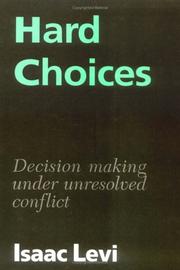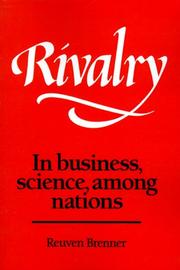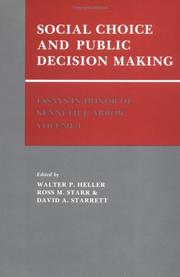| Listing 1 - 6 of 6 |
Sort by
|
Multi
ISBN: 9780121783501 0121783502 9780080956497 0080956491 Year: 1978 Publisher: New York Academic Press
Abstract | Keywords | Export | Availability | Bookmark
 Loading...
Loading...Choose an application
- Reference Manager
- EndNote
- RefWorks (Direct export to RefWorks)
This text takes a broad view of multiobjective programming, emphasizing the methods most useful for continuous problems. It reviews multiobjective programming methods in the context of public decision-making problems. Topics include a review of linear programming, the formulation of the general multiobjective programming problem, much more. 1978 edition.
Planning (firm) --- Decision making --- Planning --- Programming (Mathematics) --- Data processing --- Recherche opérationnelle. --- Décision multicritère. --- Programmation (mathématiques) --- Prise de décision. --- Operations research. --- Multiple criteria decision making. --- Decision making. --- Recherche opérationnelle. --- Décision multicritère. --- Programmation (mathématiques) --- Prise de décision.
Multi
Abstract | Keywords | Export | Availability | Bookmark
 Loading...
Loading...Choose an application
- Reference Manager
- EndNote
- RefWorks (Direct export to RefWorks)
La 4e de couverture indique : "Particulièrement novateur, le système de protection créé par la Convention européenne des droits de l'homme a contribué de manière significative au développement des droits garantis. Mais, engagé depuis une vingtaine d'années dans un processus continu de réforme dans un contexte profondément renouvelé avec l'élargissement du Conseil de l'Europe aux États d'Europe de l'Est, il est aujourd'hui confronté à de nombreux défis, non seulement du fait de l'engorgement de la Cour européenne, mais aussi en raison de la remise en cause de sa légitimité par certains États parties qui revendiquent une application du principe de subsidiarité plus respectueuse de leur particularisme quand d'autres refusent d'exécuter les arrêts de la Cour, voire menacent même de dénoncer la Convention. Dans cette perspective, le présent ouvrage propose un état des lieux, du Protocole n° 11 au Protocole n° 16, d'un système de protection entre évolution, mutation et contestation, et une réflexion sur les moyens d'en assurer la pérennité en interrogeant notamment le rôle de la Cour européenne, tiraillée entre justice individuelle et mission constitutionnelle, et le risque d'abaissement du standard européen sous la pression de certains États parties."
European law --- Human rights --- Droits de l'homme (Droit international) --- European Court of Human Rights. --- European Council --- Convention for the Protection of Human Rights and Fundamental Freedoms --- Droits de l'homme --- Droit --- Prise de décision. --- Cour européenne des droits de l'homme. --- Conseil de l'Europe.
Multi
ISBN: 9780521517324 9780521741231 0521741238 052151732X 9780511840203 1107779057 1107776643 0511840209 Year: 2009 Volume: 45 Publisher: Cambridge Cambridge University Press
Abstract | Keywords | Export | Availability | Bookmark
 Loading...
Loading...Choose an application
- Reference Manager
- EndNote
- RefWorks (Direct export to RefWorks)
This book describes the classical axiomatic theories of decision under uncertainty, as well as critiques thereof and alternative theories. It focuses on the meaning of probability, discussing some definitions and surveying their scope of applicability. The behavioral definition of subjective probability serves as a way to present the classical theories, culminating in Savage's theorem. The limitations of this result as a definition of probability lead to two directions - first, similar behavioral definitions of more general theories, such as non-additive probabilities and multiple priors, and second, cognitive derivations based on case-based techniques.
Quantitative methods (economics) --- Decision making --- Uncertainty (Information theory) --- Prise de décision --- Incertitude (Théorie de l'information) --- Decision Making --- Prise de décision --- Incertitude (Théorie de l'information) --- Business, Economy and Management --- Economics --- Decision making. --- Measure of uncertainty (Information theory) --- Shannon's measure of uncertainty --- System uncertainty --- Information measurement --- Probabilities --- Questions and answers --- Deciding --- Decision (Psychology) --- Decision analysis --- Decision processes --- Making decisions --- Management --- Management decisions --- Choice (Psychology) --- Problem solving

ISBN: 0521325277 0521386306 1139171968 9780521325271 9781139171960 9780521386302 Year: 1986 Publisher: Cambridge : Cambridge University Press,
Abstract | Keywords | Export | Availability | Bookmark
 Loading...
Loading...Choose an application
- Reference Manager
- EndNote
- RefWorks (Direct export to RefWorks)
It is a commonplace that in making decisions agents often have to juggle competing values, and that no choice will maximise satisfaction of them all. However, the prevailing account of these cases assumes that there is always a single ranking of the agent's values, and therefore no unresolvable conflict between them. Isaac Levi denies this assumption, arguing that agents often must choose without having balanced their different values and that to be rational, an act does not have to be optimal, only what Levi terms 'admissible'. This book explores the consequences of denying the assumption and develops a general approach to decision-making under unresolved conflict. Professor Levi discusses conflicts of value in several domains - those arising in moral dilemmas, the drawing of scientific inferences, decisions taken under uncertainty, and in social choice. In each of these he adapts his theoretical framework, showing how conflict may often be reduced though not always altogether eliminated.
Conflict (Psychology) --- Social conflict --- Values --- Axiology --- Worth --- Aesthetics --- Knowledge, Theory of --- Metaphysics --- Psychology --- Ethics --- Class conflict --- Class struggle --- Conflict, Social --- Social tensions --- Interpersonal conflict --- Social psychology --- Sociology --- Intrapsychic conflict --- Adjustment (Psychology) --- Motivation (Psychology) --- Decision making (Ethics) --- Conflit (Psychologie) --- Prise de décision (Morale) --- Values. --- -Social conflict --- Conflict (Psychology). --- Prise de décision (Morale) --- Social ethics --- Decision making --- Decision-making (Ethics) --- Moral and ethical aspects --- Social conflict. --- Moral and ethical aspects. --- Conflits sociaux --- Valeurs (Philosophie) --- Arts and Humanities --- Philosophy --- Decision making - Moral and ethical aspects

ISBN: 0521385849 0521331870 0511559429 9780521331876 9780521385848 9780511559426 Year: 1987 Publisher: Cambridge
Abstract | Keywords | Export | Availability | Bookmark
 Loading...
Loading...Choose an application
- Reference Manager
- EndNote
- RefWorks (Direct export to RefWorks)
Rivalry is an attempt to understand facets of entrepreneurial societies by integrating the economic analysis with historical, political and psychological considerations, customarily shunned by economists. The author argues that decisions to make new business ventures, and readiness to take risks are both related to concepts of ranking hierarchies on local, national or international levels. He then constructs a theory of business enterprise and of rivalry supported by evidence on entrepreneurship, innovation, advertising, all examined with their historical, political or organisational concerns. This notion of rivalry among businessmen is used to derive guidelines for anti-trust legislation. Instead of pricing, profitability, concentration ratios and other criteria used today to infer non-competitive behaviour, he suggests using a measure of a firm's relative rate of innovation to infer it. By extending the notion of rivalry to the political sphere, national and international, guidelines are derived to evaluate the performance of state-owned enterprises and to examine policies related to free trade.
Bedrijfsorganisatie (Economische theorie) --- Besluitvorming --- Besluitvormingsanalyse --- Besluitvormingsprocessen --- Competition --- Concurrence --- Concurrentie --- Deciding --- Decision analysis --- Decision making --- Decision processes --- Decision-making --- Décision [Prise de ] --- Décision [Théorie de la ] --- Industrial organization (Economic theory) --- Making decisions --- Management decisions --- Management--Beslissingen --- Management--Besluitvorming --- Management--Decision making --- Mededinging --- Organisation des entreprises (Théorie économique) --- Prise de décision --- Risico --- Risk --- Risque --- Théorie de la décision --- 338.040 --- 338.047 --- 338.6 --- 380.22 --- AA / International- internationaal --- Economics --- Uncertainty --- Probabilities --- Profit --- Risk-return relationships --- Industrial economics --- Market structure --- Microeconomics --- Decision (Psychology) --- Management --- Choice (Psychology) --- Problem solving --- Competition (Economics) --- Competitiveness (Economics) --- Economic competition --- Commerce --- Conglomerate corporations --- Covenants not to compete --- Industrial concentration --- Monopolies --- Open price system --- Supply and demand --- Trusts, Industrial --- Ondernemingen: algemeenheden --- Privé en openbare bedrijven. Openbare diensten. Gemengde economie --- Wetenschappelijk onderzoek en ontwikkeling --- Concurrentie. Monopolie, duopolie, oligopolie --- Economic aspects --- Organization theory --- Competition. --- Risk. --- Decision-making. --- Business, Economy and Management --- Decision making.

ISBN: 0521304547 0521304555 0521327040 0521063795 0511983530 0521063868 0511983565 0521063825 0511983549 9780521327046 9780521304542 9780521304559 9780521736893 9780521063791 9780521063821 9780521063869 9780511983535 9780511983542 9780511983566 Year: 1986 Volume: 3 Publisher: Cambridge Cambridge University press
Abstract | Keywords | Export | Availability | Bookmark
 Loading...
Loading...Choose an application
- Reference Manager
- EndNote
- RefWorks (Direct export to RefWorks)
Professor Kenneth J. Arrow is one of the most distinguished economic theorists. He has played a major role in shaping the subject and is honoured by the publication of three volumes of essays on economic theory. Each volume deals with a different area of economic theory. The books include contributions by some of the best economic theorists from the United Stated, Japan, Israel and Europe. This second volume is entitled Equilibrium Analysis and is divided into sections on general equilibrium and on the microfoundations of macroeconomics.
Public finance --- Social choice --- Decision Making --- Equilibrium (Economics) --- Macroeconomics --- Uncertainty --- Arrow, Kenneth Joseph, --- 330.1 --- Decision making --- Deciding --- Decision (Psychology) --- Decision analysis --- Decision processes --- Making decisions --- Management --- Management decisions --- Choice (Psychology) --- Problem solving --- Reasoning --- Choice, Social --- Collective choice --- Public choice --- Social psychology --- Welfare economics --- Economics --- Disequilibrium (Economics) --- Economic equilibrium --- General equilibrium (Economics) --- Partial equilibrium (Economics) --- Stagnation (Economics) --- Statics and dynamics (Social sciences) --- Economische grondbegrippen. Algemene begrippen in de economie --- Arrow, Kenneth Joseph --- 330.1 Economische grondbegrippen. Algemene begrippen in de economie --- Besluitvorming --- Besluitvormingsanalyse --- Besluitvormingsprocessen --- Choix collectif --- Collectieve keuze --- Decision-making --- Décision [Prise de ] --- Décision [Théorie de la ] --- Economisch evenwicht --- Equilibre (Economie) --- Equilibre économique --- Evenwicht (Economie) --- Incertitude --- Management--Beslissingen --- Management--Besluitvorming --- Management--Decision making --- Onzekerheid --- Prise de décision --- Théorie de la décision --- 330.35 --- 330.35 Economische groei. Kwantitatieve toename. Technische vooruitgang --zie ook {338.09} --- Economische groei. Kwantitatieve toename. Technische vooruitgang --zie ook {338.09} --- DGE (Economics) --- DSGE (Economics) --- Dynamic stochastic general equilibrium (Economics) --- SDGE (Economic theory) --- Equilibre économique. --- Economisch evenwicht. --- Business, Economy and Management --- Arrow, Kenneth Joseph, - 1921-2017 --- Social choice. --- Decision making. --- Uncertainty. --- Macroeconomics. --- Arrow, Kenneth J. --- A-lo, Kʻen-ni-ssu, --- Aluo, Kennisi, --- Arrow, Kenneth, --- Arrow, K. J.
| Listing 1 - 6 of 6 |
Sort by
|

 Search
Search Feedback
Feedback About UniCat
About UniCat  Help
Help News
News